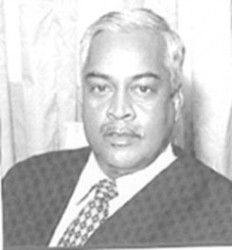Commissioner of Information Charles Ramson SC has filed a lawsuit against the government seeking just over $5.5 million which represents his unpaid gratuity for December as well as payment for his use and occupation of his own East Street property for the last year in light of the government’s failure to provide suitable accommodation for his office.
Attorney General Basil Williams SC and Minister of State Joseph Harmon are named as the defendants in the legal filings prepared by Ashton Chase SC and filed last December on Ramson’s behalf.
Stabroek News has been informed that a summons was served on the defendants last week. The matter will come up for hearing in the Commercial Court on March 16.
According to the statement of claim, Ramson is seeking $3,126,690 which represents his owed gratuity at a rate of 22½ per cent on his salary of $1,418,000 along with $2.4 million ($200,000 per month) for use of his building for the period January to December, 2016.

It says that Ramson was appointed by then President Donald Ramotar with effect from July 2, 2013 as Commissioner of Information under Section 5 of the Access to Information Act 2011 and he assumed office and remains in office to date.
Under Section 5, the statement of claim explains, he entered into a contract of employment with Ramotar in his capacity as the Commissioner of Information, the terms of which include the payment of gratuity at the end of every six months of employment at the rate of 22½ per cent of his gross salary free of income tax. “Payments were to be made to the Plaintiff [Ramson] out of budgetary allocations to the Office of the President,” the statement of claim says.
It adds that Ramson was allocated accommodation in the compound of the then Office of the President (now Ministry of the Presidency) in accordance with Section 5 “consisting of 3 large rooms, along with personal sanitary and parking facilities.”
The claim states that upon assumption of office, Ramson was also provided with staff, a complement of office equipment and furniture for use by him and his members of staff exclusively. Janitorial and security services were also provided up to September 30, 2015.
The statement of claim says that upon the change of government following the May, 2015 elections, “unilateral alterations were unlawfully made by the Defendants” to Ramson’s contract of employment but payments of salary, gratuity etc “continued until November 30th, 2016 without objection”.
It states that on or about October 1, 2015, consequent upon the unilateral alteration of Ramson’s contract, it was mutually agreed between Harmon and him that he would relocate his office to his personal and partly unoccupied premises at Lot 340 East Street, Georgetown for a period of three months “rent free, ending on 31st December, 2015,” until suitable accommodation, staff and facilities no less favourable than that accommodation could be provided by the state in accordance with Section 5 of the Act.
According to the statement of claim, Harmon visited the East Street premises and authorized the delivery of some of the office equipment formerly used at the former location and authorized the refurbishment of the security hut and the installation of the office signs at the relocated site within the month of October, 2015.
It was stated that notwithstanding several reminders to Harmon and in breach of Section 5 of the Act and the mutual agreement of October, 2015, no alternative accommodations have been provided to Ramson to date, “in spite of the threat to seek judicial intervention as a last resort.”
Ramson, the claim says, has always been ready, willing and able to execute his functions in accordance with the provisions of the Act and his contract of employment. “In breach of the aforementioned Act, the 2nd named Defendant has failed and/or refused and/or neglected to authorize the payment of gratuity to the Plaintiff in the month of December, 2016 due, owing and payable, and the Plaintiff has suffered loss and damage thereby,” it adds.
Ramson is also seeking interest at a rate of 10% until the entire sum is paid along with costs.





